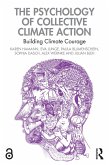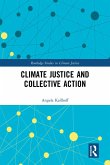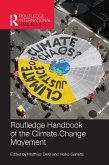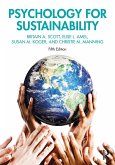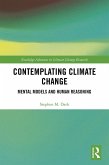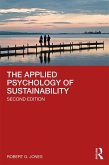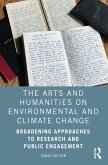The Psychology of Collective Climate Action (eBook, ePUB)
Building Climate Courage


Alle Infos zum eBook verschenken

The Psychology of Collective Climate Action (eBook, ePUB)
Building Climate Courage
- Format: ePub
- Merkliste
- Auf die Merkliste
- Bewerten Bewerten
- Teilen
- Produkt teilen
- Produkterinnerung
- Produkterinnerung

Hier können Sie sich einloggen

Bitte loggen Sie sich zunächst in Ihr Kundenkonto ein oder registrieren Sie sich bei bücher.de, um das eBook-Abo tolino select nutzen zu können.
How do we find the courage to act together against the climate crisis? This book weaves together real-life findings and examples from the socio-ecological movement with psychological research to show how motivation for collective climate action can be built.
The book addresses two key questions: how can individuals be motivated to participate in collective climate action, and how can climate groups become resilient and effective? Specifically, it explores how individuals can foster their identification with climate action groups and the belief in their joint efficacy. It touches on a wide…mehr
- Geräte: eReader
- mit Kopierschutz
- eBook Hilfe
- Größe: 31.25MB
![The Psychology of Collective Climate Action (eBook, PDF) The Psychology of Collective Climate Action (eBook, PDF)]() Karen HamannThe Psychology of Collective Climate Action (eBook, PDF)0,00 €
Karen HamannThe Psychology of Collective Climate Action (eBook, PDF)0,00 €![Climate Justice and Collective Action (eBook, ePUB) Climate Justice and Collective Action (eBook, ePUB)]() Angela KallhoffClimate Justice and Collective Action (eBook, ePUB)39,95 €
Angela KallhoffClimate Justice and Collective Action (eBook, ePUB)39,95 €![Routledge Handbook of the Climate Change Movement (eBook, ePUB) Routledge Handbook of the Climate Change Movement (eBook, ePUB)]() Routledge Handbook of the Climate Change Movement (eBook, ePUB)56,95 €
Routledge Handbook of the Climate Change Movement (eBook, ePUB)56,95 €![Psychology for Sustainability (eBook, ePUB) Psychology for Sustainability (eBook, ePUB)]() Elise L. AmelPsychology for Sustainability (eBook, ePUB)67,95 €
Elise L. AmelPsychology for Sustainability (eBook, ePUB)67,95 €![Contemplating Climate Change (eBook, ePUB) Contemplating Climate Change (eBook, ePUB)]() Stephen M. DarkContemplating Climate Change (eBook, ePUB)41,95 €
Stephen M. DarkContemplating Climate Change (eBook, ePUB)41,95 €![The Applied Psychology of Sustainability (eBook, ePUB) The Applied Psychology of Sustainability (eBook, ePUB)]() Robert G. JonesThe Applied Psychology of Sustainability (eBook, ePUB)52,95 €
Robert G. JonesThe Applied Psychology of Sustainability (eBook, ePUB)52,95 €![The Arts and Humanities on Environmental and Climate Change (eBook, ePUB) The Arts and Humanities on Environmental and Climate Change (eBook, ePUB)]() Sarah SuttonThe Arts and Humanities on Environmental and Climate Change (eBook, ePUB)37,95 €
Sarah SuttonThe Arts and Humanities on Environmental and Climate Change (eBook, ePUB)37,95 €-
-
-
The book addresses two key questions: how can individuals be motivated to participate in collective climate action, and how can climate groups become resilient and effective? Specifically, it explores how individuals can foster their identification with climate action groups and the belief in their joint efficacy. It touches on a wide range of topics, covering anger, moral considerations, activist burnout, and the perception of protests, as well as general theories of socio-ecological change.
This book is for anyone who is seeking the courage to act together and is curious about psychological insights. It will be essential reading for climate and environmental practitioners, climate activists and campaigners, climate change communicators, and anyone involved in socio-ecological change. It will also be of interest to students and researchers in the fields of environmental psychology, climate change, collective action, and political psychology.
The Open Access version of this book, available at http://www.taylorfrancis.com, has been made available under a Creative Commons (CC BY) 4.0 license.
Dieser Download kann aus rechtlichen Gründen nur mit Rechnungsadresse in A, B, BG, CY, CZ, D, DK, EW, E, FIN, F, GR, HR, H, IRL, I, LT, L, LR, M, NL, PL, P, R, S, SLO, SK ausgeliefert werden.
- Produktdetails
- Verlag: Taylor & Francis eBooks
- Seitenzahl: 244
- Erscheinungstermin: 23. Mai 2025
- Englisch
- ISBN-13: 9781040364581
- Artikelnr.: 74233330
- Verlag: Taylor & Francis eBooks
- Seitenzahl: 244
- Erscheinungstermin: 23. Mai 2025
- Englisch
- ISBN-13: 9781040364581
- Artikelnr.: 74233330
- Herstellerkennzeichnung Die Herstellerinformationen sind derzeit nicht verfügbar.
Eva Junge works as an environmental psychologist and climate communicator. She is a co-founder of Wandelwerk e.V., an advisor for socio-ecological NGOs, and an "artivist".
Paula Blumenschein is a research associate at TU Dortmund University, Germany. She works in the clinical and biological psychology working group with a focus on the climate crisis and mental health.
Sophia Dasch is an environmental psychologist and science communicator, specializing in climate education and consultation. She also works as a project manager at ConPolicy, an institute for consumer policy.
Alex Wernke works as a climate communication trainer for klima*kollektiv and as a freelance political educator.
Julian Bleh is a research associate at the Department of Social Psychology, Leipzig University, Germany, where his research is concentrated on the ability to envision social change.
Preface
Climate courage and the aims of this book
Who this book is for
The story behind this book
Defining "we"
A quick bit about Wandelwerk
Our Author Team
Two core questions
Building a bridge between science and practice
Critically reflecting on findings
What you will and will not find in this book
References
Acknowledgments
Chapter 1: Overview of the psychological model
Defining collective climate action
Examples of collective climate action
Differentiating between collective and private climate action
The Social Identity Model of Collective Action
The structure of this book
References
Part 1: Motivating for collective climate action
Chapter 2: Social identification
Defining social identification
From social identification to collective climate action
How we can strengthen identification with climate action groups
Focus 1: Highlighting the connection to climate action groups
Focus 2: Creating climate action groups that meet people's needs
Discovering your social identification
References
Chapter 3: Moral beliefs and emotions
Defining moral beliefs
Core values
From moral beliefs and emotions to collective climate action
Guilt
Anger
How we can use moral beliefs and emotions as tools for effecting collective
climate action
Focus 1: Creating anger-eliciting situations
Focus 2: Using moral beliefs and anger to build external support
Discovering your value basis
References
Chapter 4: Framing climate action
Defining framing
Challenging existing frames
How we can create frames for collective climate action
Considering target audiences in framing decisions
References
Chapter 5: Efficacy beliefs
Defining efficacy beliefs
Collective efficacy
Participative efficacy
From efficacy beliefs to collective climate action
Building efficacy beliefs
Maintaining efficacy beliefs
How we can foster efficacy beliefs
Focus 1: Accentuating positive changes
Focus 2: Designing group contexts that nurture efficacy
Discovering your efficacy beliefs
References
Chapter 6: Psychological effects of collective climate action
Action first, motivation second
Effects of an action's success or failure
Strategies for coping with failure
Social strategies (a social and shared mindset)
Reframing strategies (another perspective)
Distancing strategies (another focus)
Changing strategies (another action)
The spillover effect between private behaviors and collective action
References
Chapter 7: Summary of the model
Applying the pillars of motivation to drive collective climate action
References
Part 2: Cultivating resilient and effective collective climate action
Chapter 8: Resilient collective action and activist burnout
Don't underestimate activist burnout
Defining activist burnout
Causes of activist burnout
Personal and psychological factors
Group norms fueling burnout
Problems within groups kindling burnout
Building resilient climate action groups
Group-focused strategies for resilient collective climate action
Individual-focused strategies for resilient collective climate action
Group exercise for assessing activist burnout
References
Chapter 9: Socio-ecological transformation
Looking at the bigger picture
Defining socio-ecological transformation
The Multi-Level Perspective
Three levels of change
The theory of change for the Multi-Level Perspective
The Social Tipping Point concept
The theory of change for the Social Tipping Points
The Three Strategies of Transformation
Circumstances of transformation
The theory of change for the Three Strategies of Transformation
The Movement Action Plan
The four roles within social change
The theory of change for the Movement Action Plan
Take-aways
Common features of theories of change
Your take on socio-ecological change
References
Chapter 10: Effective goals for climate groups
Picking your battles: Goals and target groups
Target group descriptions
Strategies for achieving target group goals
Achieving these goals using SOCIAL IDENTIFICATION
Achieving these goals using MORAL BELIEFS
Achieving these goals using FRAMING
Achieving these goals using EFFICACY BELIEFS
Achieving these goals using COLLECTIVE ACTION
Achieving these goals using RESILIENCE STRATEGIES
Defining your goals and strategies
References
Chapter 11: Conclusion, recommendations, and further ideas
Final words
Research areas in need of addressing
Recommended books and videos to explore
References
Appendix: Overview of research designs
Individual experiences
Qualitative research
Quantitative research
References
Preface
Climate courage and the aims of this book
Who this book is for
The story behind this book
Defining "we"
A quick bit about Wandelwerk
Our Author Team
Two core questions
Building a bridge between science and practice
Critically reflecting on findings
What you will and will not find in this book
References
Acknowledgments
Chapter 1: Overview of the psychological model
Defining collective climate action
Examples of collective climate action
Differentiating between collective and private climate action
The Social Identity Model of Collective Action
The structure of this book
References
Part 1: Motivating for collective climate action
Chapter 2: Social identification
Defining social identification
From social identification to collective climate action
How we can strengthen identification with climate action groups
Focus 1: Highlighting the connection to climate action groups
Focus 2: Creating climate action groups that meet people's needs
Discovering your social identification
References
Chapter 3: Moral beliefs and emotions
Defining moral beliefs
Core values
From moral beliefs and emotions to collective climate action
Guilt
Anger
How we can use moral beliefs and emotions as tools for effecting collective
climate action
Focus 1: Creating anger-eliciting situations
Focus 2: Using moral beliefs and anger to build external support
Discovering your value basis
References
Chapter 4: Framing climate action
Defining framing
Challenging existing frames
How we can create frames for collective climate action
Considering target audiences in framing decisions
References
Chapter 5: Efficacy beliefs
Defining efficacy beliefs
Collective efficacy
Participative efficacy
From efficacy beliefs to collective climate action
Building efficacy beliefs
Maintaining efficacy beliefs
How we can foster efficacy beliefs
Focus 1: Accentuating positive changes
Focus 2: Designing group contexts that nurture efficacy
Discovering your efficacy beliefs
References
Chapter 6: Psychological effects of collective climate action
Action first, motivation second
Effects of an action's success or failure
Strategies for coping with failure
Social strategies (a social and shared mindset)
Reframing strategies (another perspective)
Distancing strategies (another focus)
Changing strategies (another action)
The spillover effect between private behaviors and collective action
References
Chapter 7: Summary of the model
Applying the pillars of motivation to drive collective climate action
References
Part 2: Cultivating resilient and effective collective climate action
Chapter 8: Resilient collective action and activist burnout
Don't underestimate activist burnout
Defining activist burnout
Causes of activist burnout
Personal and psychological factors
Group norms fueling burnout
Problems within groups kindling burnout
Building resilient climate action groups
Group-focused strategies for resilient collective climate action
Individual-focused strategies for resilient collective climate action
Group exercise for assessing activist burnout
References
Chapter 9: Socio-ecological transformation
Looking at the bigger picture
Defining socio-ecological transformation
The Multi-Level Perspective
Three levels of change
The theory of change for the Multi-Level Perspective
The Social Tipping Point concept
The theory of change for the Social Tipping Points
The Three Strategies of Transformation
Circumstances of transformation
The theory of change for the Three Strategies of Transformation
The Movement Action Plan
The four roles within social change
The theory of change for the Movement Action Plan
Take-aways
Common features of theories of change
Your take on socio-ecological change
References
Chapter 10: Effective goals for climate groups
Picking your battles: Goals and target groups
Target group descriptions
Strategies for achieving target group goals
Achieving these goals using SOCIAL IDENTIFICATION
Achieving these goals using MORAL BELIEFS
Achieving these goals using FRAMING
Achieving these goals using EFFICACY BELIEFS
Achieving these goals using COLLECTIVE ACTION
Achieving these goals using RESILIENCE STRATEGIES
Defining your goals and strategies
References
Chapter 11: Conclusion, recommendations, and further ideas
Final words
Research areas in need of addressing
Recommended books and videos to explore
References
Appendix: Overview of research designs
Individual experiences
Qualitative research
Quantitative research
References

